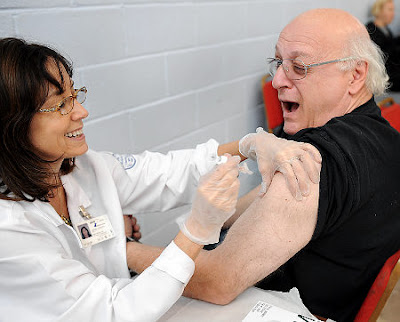 The CDC has published practice guidelines for giving inoculations for the H1N1 (swine) flu. Because there is not enough vaccine to immediately inoculate everyone, priority is being given to the following categories of younger people (and health care workers). From the CDC “Vaccination Recommendations:”
The CDC has published practice guidelines for giving inoculations for the H1N1 (swine) flu. Because there is not enough vaccine to immediately inoculate everyone, priority is being given to the following categories of younger people (and health care workers). From the CDC “Vaccination Recommendations:”
- Pregnant women...
- Household contacts and caregivers for children younger than 6 months...
- Healthcare and emergency medical services personnel...
- All people from 6 months through 24 years of age
- Children from 6 months through 18 years of age because we have seen many cases of novel H1N1 influenza in children and they are in close contact with each other in school and day care settings, which increases the likelihood of disease spread, and
- Young adults 19 through 24 years of age because we have seen many cases of novel H1N1 influenza in these healthy young adults and they often live, work, and study in close proximity, and they are a frequently mobile population; and,
- Persons aged 25 through 64 years who have health conditions associated with higher risk of medical complications from influenza.
Then, healthy younger people are next in line who are not otherwise included among the prioritized groups:
Once the demand for vaccine for the prioritized groups has been met at the local level, programs and providers should also begin vaccinating everyone from the ages of 25 through 64 years.
What about people 65 and older? They are at the end of the line. But wait: Before we scream, “Age discrimination!” the CDC has an apparently cogent reason for putting older people last:
Current studies indicate that the risk for infection among persons age 65 or older is less than the risk for younger age groups. However, once vaccine demand among younger age groups has been met, programs and providers should offer vaccination to people 65 or older.
Okay, maybe that’s understandable. But what I don’t get is not including people age 65 and older who have compromised immune systems and higher risk of medical complications if they contract diseases such as flu along with the younger cohort with these issues who do receive priority. I mean it isn’t as if older people are immune to the thing, and if they do and have existing health issues that cause serious complications, it could kill them just as dead as a younger person with such problems.
Don’t get me wrong: I am not accusing the CDC of Ezekiel Emanualism, but could someone please explain to me why a healthy younger person receives priority for a swine flu vaccine over an unhealthy older person?



